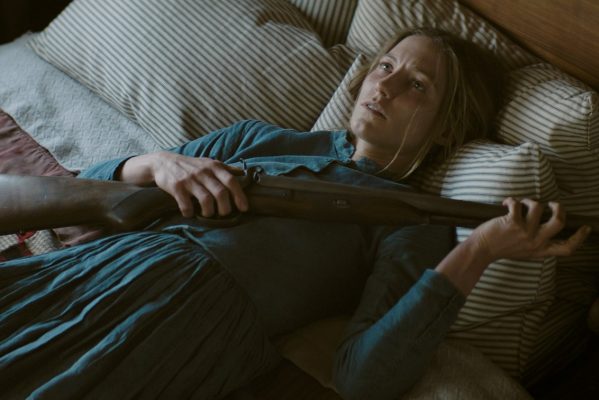As part of Edinburgh International Film Festival 2019.
It takes some skill to make the great outdoors a source of oppression and claustrophobia, but that’s what director Emma Tammi has managed to achieve. The Wind is a psychological horror with a western frontier setting that plays on very real fears of isolation, paranoia and exposure to case a gloomy supernatural spell.
Lizzy Macklin (Caitlin Gerard) has built a homestead in the remove West with her husband Isaac (Ashley Zukerman). All is going well until the arrival of another couple, Emma and Gideon (Julia Goldani Telles and Dylan McTee) coincides with Lizzy’s growing fear that something evil lurks in the dark, its footsteps masked by the constant howling wind.
The Wind may be framed as a four-handed chamber piece, but it’s really an intense character study of one woman. We see everything from the perspective of Lizzy and it becomes clear early on that she may not be the most reliable witness. Events are shown in non-linear fashion with a constant sense of dislocation and atmospheric chill, and it’s initially difficult to tell where past and present events begin and end.
It does becomes clear what has happened between the two couples however, and this is one of the film’s weaknesses, as it’s obviously before the filmmakers intend. Writer Teresa Sutherland, who has done an otherwise great job establishing character and mood, fails to maintain the human mystery, despite some narrative sleight of hand. Pretty much every audience member will have figured out exactly what’s occurred before it’s confirmed.
Nevertheless, Tammi keeps the atmosphere as ambiguous as possible with its supernatural elements, aided by the eerie setting that’s pregnant with terrors, unsettling sound design, and a startling, full-bore performance from Gerard. Lizzy is a formidable outdoors-woman, who you sense has lived a tough life (she quite often resorts to praying in German, so there’s a hint of the immigrant experience). She’s also a religious zealot, and Gerard slowly chips the walls of her pragmatism away until she’s seeing demonic presences in every corner. Are those ravenous wolves corporeal or shape-shifting entities? Are those figures in the shadows manifestations of a demon, or of guilt and madness?
We’re shown early on that death has stalked these plains. Lizzy passes a tiny, lifeless bundle to her husband, and Emma is laid to rest in a coffin, missing a good portion of her head. We don’t know at what point of Lizzy’s narrative this takes place exactly, but it’s unlikely it will end well.
Whether The Wind falls on the side of the supernatural or the psychological is open to interpretation, although most will feel it does lean in the favour of one direction in particular. What is certain, and why it is so effective despite some story-telling shortcomings, is that much of the horror lies apart from this question. Even if Lizzy can extricate herself from her situation, where can she possible go? Her horror is created partly by her own actions, and it’s the sense of loneliness, disorientation and despair that creates such a chill, more than any demonic nightmares.
The Wind is horror on a base, primal level, as its elemental title suggests. It has its flaws, but the cloying sense of dread conjured by Tammi and Sutherland will two locations and the most minimal cast is hugely impressive.
UK Premiere screening at Filmhouse, Edinburgh, Fri 28 and VUE Omni Centre, Sat 29 Jun 2019
